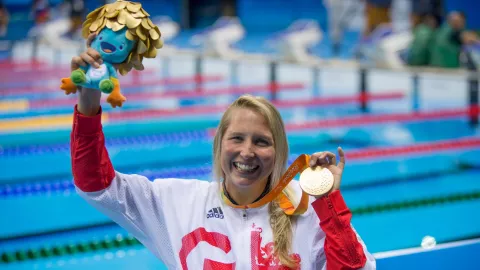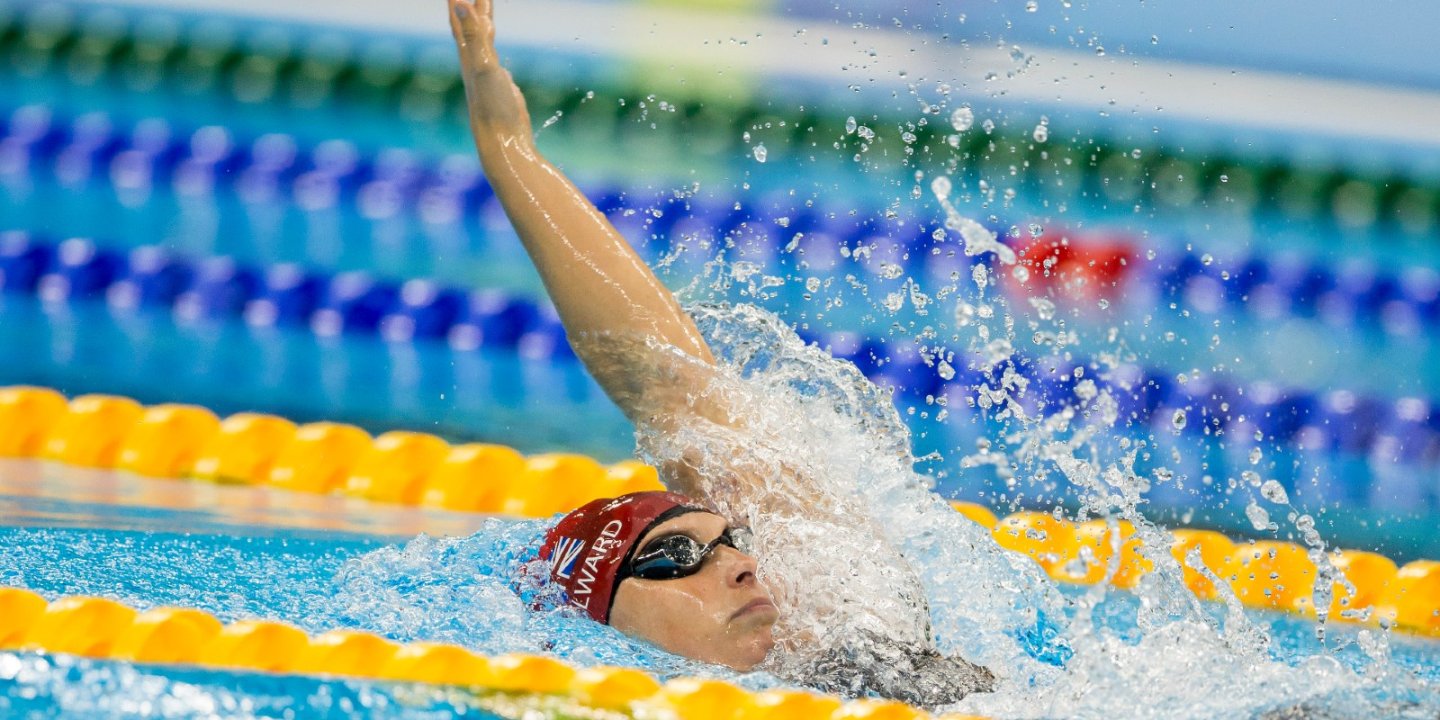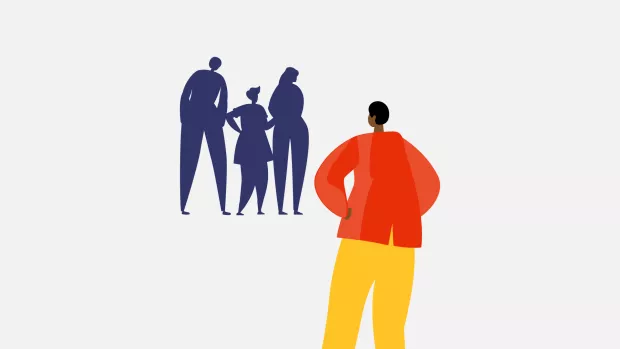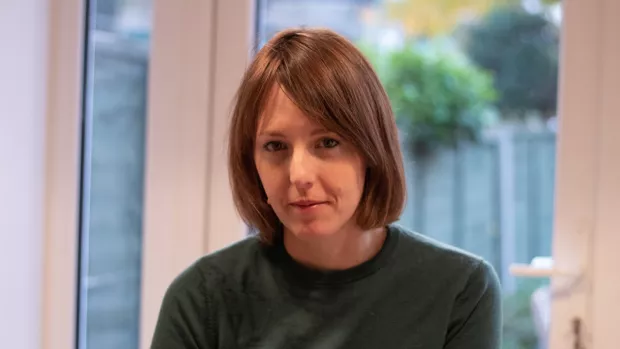
It took me 8 years to open up about my MS
Paralympic swimmer and MS Society Ambassador Stephanie Millward MBE on her diagnosis, the difficult years that followed and how she learned it’s good to talk.
Back in 1998, I was a 16-year-old schoolgirl and the British National 100 metre Backstroke Champion. I had my sights firmly set on the Sydney 2000 Olympic Games.
Out of nowhere I started experiencing symptoms like eyesight and dizziness problems. Then I had walking issues, temporary blindness and paralysis. The months leading up to my MS diagnosis were hard because these symptoms didn't have an explanation, and no one could tell me what was happening to me.
People didn’t understand my diagnosis
The diagnosis felt like a relief because we could focus on what I had and what I could do. But many people couldn’t really believe or understand how this could happen to a fit 16-year-old. Their reactions were generally unhelpful.
Given my swimming status, it was impossible to keep the diagnosis quiet despite my wish to curl up into a ball and never see anyone again.
Within months, I was making headlines in the national press as I needed a disease modifying therapy (DMT), a beta interferon, which wasn’t yet available to everyone who could benefit from it.
There are now over a dozen DMTS for MS available on the NHS - read more
My life changed dramatically, and I didn’t cope with it. I didn’t get A-Levels, I didn’t go to university, I didn’t go to the Olympics, I didn’t have boyfriends (or even friends). I stopped swimming.
I didn’t want to speak to anyone about MS
I felt embarrassed by having the illness and never wanted to discuss it with anyone, or want anyone to know I was unwell.
After leaving school, I got a job in a local shop. I didn’t tell my employer, fearing I wouldn’t have been a successful applicant, but he soon found out I had MS. The relationship deteriorated as a result and I soon lost my job. [it’s illegal to discriminate against someone at work because of their MS – read more]
It took me 8 years before I was comfortable speaking about my MS. Before then I suffered from depression and even considered suicide. I didn't want to see or speak to anyone. I felt as if I had let myself down and I didn't see any way of coping or any way out.
I struggled to walk – in fact I struggled with everything as the MS took over my life. I was both physically and, even more so, mentally sick.
I needed help, but I was unable to accept it nor did I get it.
Taking control of my life
By sheer chance I was persuaded back into a pool in late 2007, and things changed. I slowly took control of my life and, thankfully, some of the symptoms eased!
Although I was totally different from the swimmer I was in 1998, the pool became my safe place. It was somewhere I found peace and happiness. I went on to compete at Beijing in 2008, win 5 medals at London four years later and then win another 5 medals at Rio 2016, including my most prized two gold medals.

Having lost funding as an elite athlete after Rio, but not being ready to retire yet, I found a small team of people who really cared about me. Together with my amazing husband Adrian, I’ve worked with them on my swimming career and planned for my future. And we’ve looked at every aspect of my illness. I’ve kept a diary of my symptoms and begun to work out how MS affects me.
Knowing myself better helped me talk about MS
I have never felt better, fitter, stronger. I know myself and how I work best.
Since returning to swimming, I have no problems chatting to people who are interested about MS.
I’ve even become an Ambassador for the MS Society. With this role there is an expectation to talk and now I’m happy to do this - especially if I think it will prevent another person suffering their own ‘8-year misery’.
It’s so important people have others to talk to
One of the many joys of being a Paralympic Swimmer is that I’ve been invited to speak at school assemblies and to sports teams and even companies. When I tell my story, I’m always amazed by the various reactions.
After any talk, presentation or meeting, I make myself available to those who’ve listened. There’s rarely an event when something I’ve said hasn’t resonated with someone in the audience and they want to share this with me.
It’s just so important that people have others to talk to. All our journeys through this life are unique, but so many involve illness and tragedy. It’s critical we learn how to cope with this, especially when we’re young.
Speaking up about all my MS symptoms
I have little confidence talking about bladder or bowel issues, as these are rarely discussed. However when I’m talking to someone newly diagnosed, I always try to confirm my own symptoms, (which can be miserable and embarrassing) as I’m sure they affect many of us with MS.
One time, when still at school, I was mortified when standing in the gym and one of the other students said “I think you need to go to the toilet, you have wet yourself” – I thanked him and rushed off, but was so embarrassed and assumed, probably incorrectly, that everyone was laughing at me.
Not all disabilities are visible
I have a Blue Badge, so I can park my car close to the pool or supermarket, as I can’t walk very far. Quite often I’m unable to walk at all (I always have a wheelchair in the boot).
On my good days, I’m often mistaken for an able-bodied swimmer and nothing would give a clue to a stranger that I have MS. People have challenged me. These thoughtless comments or accusations can be hurtful.
Finding the right support
Over the last year, I suffered 3 bereavements and my doctor recommended I saw a clinical psychologist. This has been life-changing. It’s allowed me to grieve for my lost friends and relations. And not only that, I’ve explored my past, my original MS diagnosis and many other ‘blurred areas’ I’ve suppressed for years and never really dealt with.
I wish I’d had access to this support 20 years ago. After my MS diagnosis, I wasted 8 precious years of my life feeling utterly miserable, useless and depressed.
It’s so vital to find the right people and organisations that can support and re-build confidence, give purpose and help find a ‘reason for living’. For me, I re-found swimming.
More recently, I have found and adore book-keeping and with both experience and qualifications believe I will make a second career (after swimming) in this field.
Looking for emotional support? Contact our MS Helpline on freephone 0808 800 8000 or email [email protected]. We’re here Monday to Friday, 9am to 7pm except bank holidays.
#LetsTalkMS
This MS Awareness Week (19-25 April 2021) we’re saying #LetsTalkMS.
MS can be tough, and for many people talking about it can be challenging. Help start a conversation about MS – share your story
Ways to talk MS
Our online sessions and webinars are a great way to connect online. You can also join the conversation at Facebook, Instagram and Twitter. And our MS Helpline is here for you, offering emotional support and information.




